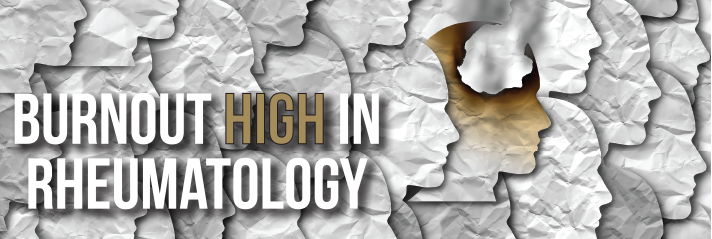
Lightspring / shutterstock.com
A new Medscape survey found that rheumatology has the second-highest burnout level among the 29 specialties included, with 50% of the rheumatology respondents saying they’re experiencing “burnout.”
To which some rheumatologists are responding: Really?
“I was quite surprised by this,” says Beth Jonas, MD, chief of the Rheumatology, Allergy and Immunology Division at the University of North Carolina School of Medicine, Chapel Hill, and chair of the ACR Committee on Rheumatology Training and Workforce Issues. She wonders about the survey’s methodology, but also says burnout is an issue that deserves attention and action.
According to Medscape, more than 12,000 Medscape physician members responded to the survey, and 1% of them were rheumatologists, meaning it included responses from about 120 rheumatologists.1
The results of the survey are especially confusing because rheumatology has been known as a specialty with “happy” physicians—even in many previous Medscape surveys. Just last year, another Medscape survey found rheumatologists were top-ranked for being happy outside the workplace, with 60% reporting being happy. This year, 79% of rheumatology respondents reported being happy outside the workplace before the COVID-19 pandemic. After the pandemic hit, only 49% said they were happy outside work.2,3
“I think there are a lot of caveats to this ‘research’—and I use that term very loosely,” Dr. Jonas says. “I think this is based on an extremely small sample. We really do not understand how burnout was defined.”
In last year’s Medscape survey on burnout, 46% of rheumatologists said they were burned out, the 8th highest percentage among specialties. In 2019, 41% of rheumatologists said they were burned out (16th), and in 2018, 38% (21st). In the 2017 survey, 54% of rheumatologists said they were burned out (6th).
“Those are basically the wiggle of the study,” rather than a true portrayal of burnout levels, says Martin Bergman, MD, a rheumatologist and clinical professor of medicine at Drexel University College of Medicine, Philadelphia, who has researched burnout among rheumatologists. “There’s no intellectual reason why that would happen over a five-year period.”
In the survey, the biggest contributor to burnout identified by all the respondents across all specialties was “too many bureaucratic tasks”—58% gave that answer—followed by spending too many hours at work and lack of respect from administrators and colleagues, both at 37%.
In the comments published along with the Medscape survey, some physicians wondered about how respondents understood the term “burnout.”
“I’m not sure if the respondents really understood what burnout is,” one commenter wrote. “That a third said it didn’t affect their lives tells me they are not burned out. Burned out means you are barely able to hold on, and each day has to be personally negotiated as to whether you carry on.”
Many commenters took the opportunity to express their own reasons for feeling overwhelmed at work, such as patient load and the demands of the electronic health record system.



